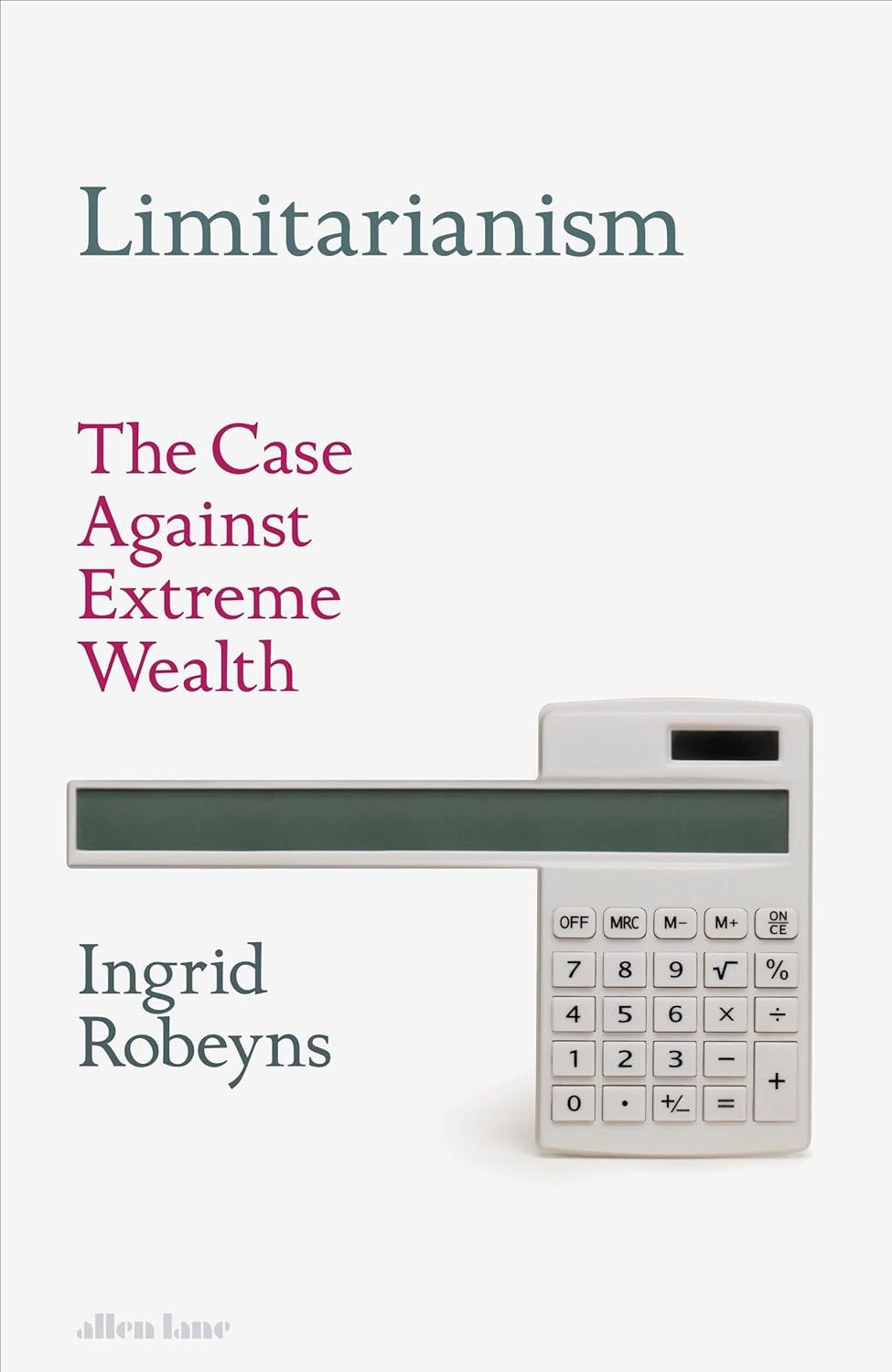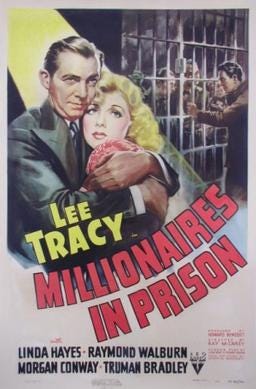There’s a new book out today that I’m looking forward to - Limitarianism, by Ingrid Robeyns. It’s an economic argument for a maximum wealth law.
Seven years ago I was asked by the Big Issue to write about the one thing I would do to improve things, if I had the power, and I also wrote about a maximum wealth law. Due to the format of the column, this was printed with the headline ‘Why Don’t We Just… jail people with more than £100million?’, which I still find incredibly funny.
You can read that article here, if you’re curious. As you’ll notice, it was written in the spirit of mischief. The idea is so far outside the Overton Window of acceptable discourse that just offering it up is automatically spiky and provocative. True, it’s an established principle that people who harm society can be jailed, and it’s clear that excessive accumulation of wealth dramatically damages society, but bringing these two thoughts together is still pretty taboo.
I convinced precisely no-one with that article, but I hope Robeyns will have more luck with her book. She’s an economics professor at the University of Utrecht, and her book comes with support from people like Thomas Piketty and the billionaire heiress Abigail Disney, so it is a far more credible thing than me being cheeky in the Big Issue. As far as I can tell, she doesn’t stress the ‘jail’ part, which I suspect is necessary to make the idea seem plausible, but she does gives the idea a name - Limitarianism - which always helps to crystalise things. I will keep be keeping a curious eye on the reaction to the book, and hope for the best.
BE CAREFUL WHAT YOU WRITE
I did learn something useful from writing that piece, though. While I saw it as a bit of a lark as I was writing it, I found that afterwards I stood by it and believed in its argument - regardless of whether anyone else did. It fitted my prejudices and baggage and I found it convincing. This taught me to be careful as a writer, because when you write something down, you trick yourself into thinking that it’s true.
Normally you have a whole mess of differing thoughts and contradictory ideas sloshing around in your head, and the amount of credibility you grant them varies from day to day. The act of writing something down turns a fluid and changeable notion into something definite and fixed, and this seems to trick the mind into thinking that it’s true. You no longer have to worry about it anymore. You just stand by it.
This effect can be positive. Practices like writing affirmations and journaling can be helpful for these reasons. But in the world of social media, it can send you very wrong indeed. Much is made of the impact of algorithms on people getting lost down increasingly extreme rabbit holes of belief, but I suspect that simply typing your opinions down is also a significant factor.
I found an extreme example of this recently. In a post by Cory Doctorow, he mentioned EL Doctorow’s (no relation) writing on the Book of Genesis, a myth that the Hebrews took from the Babylonians. In his essay, EL Doctorow “describes how the ancient Babylonians were so poleaxed by the strange wonder of the story they made up about the origin of the universe that they assumed that it must be true. They themselves weren't nearly imaginative enough to have come up with this super-cool tale, so God must have put it in their minds.”
Imagine that! Imagine writing Genesis, and in doing so convincing yourself that it must be true. That would be a writing session to remember. Admittedly Blake would have said that the Babylonians had it right, for the imagination is divine, but that aside - there is a warning to us all here. You can cause yourself a lot of trouble when you fall for what you write down.
If you have ever wondered why writers are all mad, here is the reason. Newspaper columnists, in particular - there is no hope for them. It is an occupational hazard. This is why you should be mindful about what you write in online spats. Be careful, or you might end up believing yourself.
UPCOMING
I’ve mentioned before that I’m turning down any public events around my books this year, which in theory would allow me to concentrate on writing. Needless to say, I then immediately agreed to interview a bunch of people at their events instead.
For example, I’m excited to be talking to Joel Gion of the Brian Jonestown Massacre at Dead Wax Social in Brighton on 29 February, as part of his book tour for his memoir In The Jingle Jangle Jungle - tickets for that are here.
Then on 19 March I’ll be back there to talk to Richard Norris about his fantastic book Strange Things Are Happening. Details and tickets are here.
On 22 February I’ll be heading to the amazing new Aviva Studios in Manchester as part of an event called The Fête of Britain, billed as ‘A four-day celebration of collaboration and imagination in the face of the great challenges of our time.’ The finished programme isn’t out yet so details are still sketchy, but it’s looking like I’ll be joining Jeremy Deller, Jay Griffiths and possibly others to discuss myth, storytelling, and how that might help us navigate the near future. Keep an eye here for more details.
On 3 March I’ll be talking to director Ben Wheatley after a screening of A Field In England at the second session of the East Sussex Psychedelic Film Club - ESP FC - In Lewes. This event sold out in a day, but keep an eye on the Instagram account for future events.
And here’s a couple of podcast interviews before I go - I’m on the Hilaritas Press pod, talking about Robert Anton Wilson, the KLF and William Blake. You can find that here.
I’m also on John Bleasdale’s Writers on Film pod, talking about James Bond and the Beatles. This one is just out today.
Until next time!
jhx










Excellent as ever. Now I’ve written that, I believe it all the more
On the power of writing things down... Jonathan Rowson recently published something similar albeit with a more positive emphasis on its possibilities called 'Acting ourselves into new ways of thinking'
I quickly stole the best lines to update my About page coz obviously it captures my argument about money! And I guess having written and done so much stuff that goes against the grain of economic thought.... I'm not really inclined toward an economic argument for a 'wealth law'. It take a really good Higgs review to make me read it! :-)